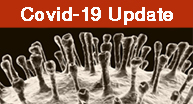Oncolytic effect of SARS-CoV2 in a patient with NK lymphoma
Spontaneous remission in NK/T-cell Lymphoma during Covid-19
Keywords:
SARS-CoV2 Covid-19 NK lymphoma EBV DNA RemissionAbstract
Covid-19 infection was a possible causal factor in the exhaustion and decrease number of NK clonal cells, resulting in a evident improvement of signs, symptoms and clinical features related to NK lymphoma refractory to previous immuno-chemiotherapy.
It has been shown that SARS-CoV2 binds to ACE2. Covid-19 may infect NK cells to suppress their functions, as NK cells express angiotensin converting enzyme 2 (ACE2). The excessive production of proinflammatory cytokines in Covid-19 infection may have played a crucial role in lymphodepletion. Although not published in Covid-19, other RNA viruses that cause acute pulmonary infections promote NK cell apoptosis.
In NK/T-cell lymphoma plasma EBV-DNA is a sensitive surrogate biomarker of lymphoma load. In this case, we also notice a dramatic transient reduction in plasmatic EBV-DNA viral copies during Covid-19 pneumonia other than NK clonal cells reduction, and after the infection resolution we described a lymphoma relapse as well as EBV-DNA increase and the rising in NK clonal cells count.
Although the mechanism leading to spontaneous remission remain uncharacterized, we hypothezised that a favorable adaptive immunity against concurrent viral infection could render an enhanced anti-tumor effect. We suppose COVID-19 infection have induced a transient remission in this patient affected with NK neoplasm.
References
Wang F, Nie J, Wang H, et al. Characteristics of peripheral lymphocyte subset alteration in COVID-19 Pneumonia. J Infect Dis. 2020 Mar 30. [Epub ahead of print]
Zheng M, Gao Y, Wang G, et al. Functional exhaustion of antiviral lymphocytes in COVID-19 patients. Cell Mol Immunol 2020 Mar 17. [Epub ahead of print]
Santos JM, Cervera-Carrascon V, Havunen R, et al. Adenovirus Coding for Interleukin-2 and Tumor Necrosis Factor AlphaReplaces Lymphodepleting Chemotherapy in Adoptive T Cell Therapy. Mol Ther 2018 Sep 5;26(9):2243-2254.
Snijder J, Mihyawi N, Frolov A, et al. Spontaneous remission in diffuse large cell lymphoma: a case report. J of Med Case Reports. 2019 13:28.
Musto P et al. Spontaneus remission in Acute Myeloid Leukaemia: A role for endogenous production of Tumour necrosis factor and Interleukin-2? Br J Haematol. 1994 Aug;87(4): 879-80.

Downloads
Published
Issue
Section
License
This is an Open Access article distributed under the terms of the Creative Commons Attribution License (https://creativecommons.org/licenses/by-nc/4.0) which permits unrestricted use, distribution, and reproduction in any medium, provided the original work is properly cited.
Transfer of Copyright and Permission to Reproduce Parts of Published Papers.
Authors retain the copyright for their published work. No formal permission will be required to reproduce parts (tables or illustrations) of published papers, provided the source is quoted appropriately and reproduction has no commercial intent. Reproductions with commercial intent will require written permission and payment of royalties.






